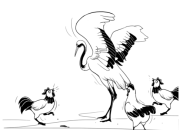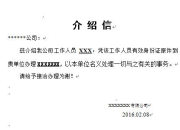英语作文写作的需要背诵的部分(3)
时间:2021-08-31The correct response, it seems to me, is, is we ready to do away with standards and judgments? Is anyone going to argue seriously that a life of cheating and swindling is as worthy as a life of honest, hard work? Is anyone (with the exception of some literature professors at our elite universities) going to argue seriously the intellectual corollary, that a Marvel comic book is as good as Macbeth? Unless we are willing to embrace some pretty silly position, we’ve got to admit the need for moral and intellectual standards. The problem is that some people tend to regard anyone who would pronounce a definitive judgment as an unsophisticated Philistine or a closed-minded “elitist” trying to impose his view on everybody else.
The truth of the real world is that without standards and judgments, there can be no progress. Unless we are prepared to say irrational things—that nothing can be proven more valuable than anything else or that everything is equally worthless—we must ask the normative question. It may come, as a surprise to those who fell that to be “progressive” is to be value-neutral. But as Matthew Amold said, “the world is forwarded by having its attention fixed on the best things” and if the world can’t decide what the best things are, at least to some degree, then it follows that progress, and character, is in trouble. We shouldn’t be reluctant to declare that some things, some lives, books, ideas, and values are better than others. It is the responsibility of the schools to teach these better things.
At one time, we weren’t so reluctant to teach them. In the mid-nineteenth century, a diverse, widespread group of crusaders began to work for the public support of what was then called the “common school”, the forerunner of the public school. They were to be charged with the mission of school felt that the nation could fulfill its destiny only if every new generation was taught these values together in a common institution.
The leaders of the common school movement were mainly citizens who were prominent in their communities—businessmen, ministers, local civic and government officials. These people saw the schools as upholders of standards of individual morality and small incubators of civic and personal virtue; the founders of the public schools had faith that public education could teach good moral and civic character from a common ground of American values.
But in the past quarter century or so, some of the so-called experts became experts of value neutrality, and moral education was increasingly left in their hands. The commonsense view of parents and the publicthat schools should reinforce rather than undermine the values of home, family, and country, was increasingly rejected.
But there are values that all American citizens share and that we should want all American students to know and to make their own: honesty, fairness, self-discipline, fidelity to task, friends, and family, personal responsibility, love of country, and belief in the principles of liberty, equality, and the freedom to practice one’s faith. The explicit teaching of these values is the legacy of the common schools, and it is a legacy to which we must return.
9. Schools Should Teach Values
People often said, “Yes, we should teach these values, but how do we teach them?” this question deserves a candid response, one that isn’t given often enough. It is by exposing our children to good character and inviting its imitation that we will transmit to them a moral foundation. This happens when teachers and principals, by their words and actions, embody sound convictions. As Oxford’s Mary Warnock has written, “You cannot teach morality without being committed to morality yourself; and you cannot be committed to morality yourself without holding that some things are right and others wrong.” The theologian Martin Buber wrote that the educator is distinguished from all other influences “by his will to take part in the stamping of character and by his consciousness that he represents in the eyes of the growing person a certain selection of what is, the selection of what is ‘right’, of what should be.” It is in this will, Buber says, in this clear standing for something, that the “vocation as an educator finds its fundamental expression.”
There is no escaping the fact that young people need as example principals and teachers who know the difference between right and wrong, good and bad, and who themselves exemplify high moral purpose.
As Education Secretary, I visited a class at Waterbury Elementary School in Waterbury, Vermont, and asked the students, “Is this a good school?” They answered, “Yes, this is a good school.” I asked them, “Why?” Among other things, one eight-year-old said, “The principal Mr. Riegel, makes good rules and everybody obeys them.” So I said, “Give me an example.” And another answered, “You can’t climb on the pipes in the bathroom. We don’t climb on the pipes and the principal doesn’t either.”
You can’t expect children to take messages about rules or morality seriously unless they see adults taking those rules seriously in their day-to-day affairs. Certain must be said, certain limits lay down, and certain examples set. There is no other way.
We should also do a better job at curriculum selection. The research shows that most “values education” exercises and separate courses in “moral reasoning” tend not to affect children’s behavior; if anything, they may leave children morally adrift. Where to turn? I believe our literature and our history are a rich quarry of moral literacy. We should mine that quarry. Children should have at their disposal a stock of examples illustrating what we believe to be right and wrong, good and bad—examples illustrating what are morally right and wrong can indeed be known and that there is a difference.
What kind of stories, historical events, and famous lives am I talking about? If we want our children to know about honesty, we should teach them about Abe Lincoln walking three miles to return six cents and conversely, about Aesop’s shepherd boy who cried wolf if we want them to know about courage, we should teach them about Joan of Arc, Horatius at the bridge, and Harriet Tubman and the Underground Railroad. If we want them to know about persistence in the face of adversity, they should know about the voyages of Columbus and the character of Washington during the Civil War. And our youngest should be told about the Little Engine That Could. If we want them to know about respect for the law, they should understand why Socrates told Crito: “No, I must submit to the decree of Athens.” If we want our children to respect the rights of others, they should read the Declaration of Independence, the Bill of Rights, the Gettysburg Address, and Martin Luther King, Jr.’ “Letter from Birmingham jail.” From the Bible they should know about Ruth’s loyalty to Naomi, Joseph’s forgiveness of his brothers, Jonathan’s friendship with David, the Good Samaritan’s kindness toward a stranger, and David’s cleverness and courage in facing Goliath.
These are only a few of the hundreds of examples we can call on. And we need not get into issues like nuclear war, abortion, creationism, or euthanasia. This may come as a disappointment to some people, but the fact is that the formation of character in young people is educationally a task different from, and prior to, the discussion of the great, difficult controversies of the day. First things come first. We should teach values the same way we teach other things: one step at a time. We should not use the fact that there are many difficult and controversial moral questions as an argument against basic instruction in the subject.











